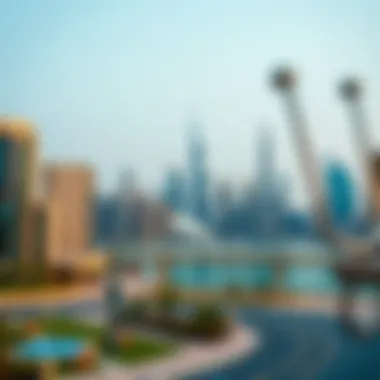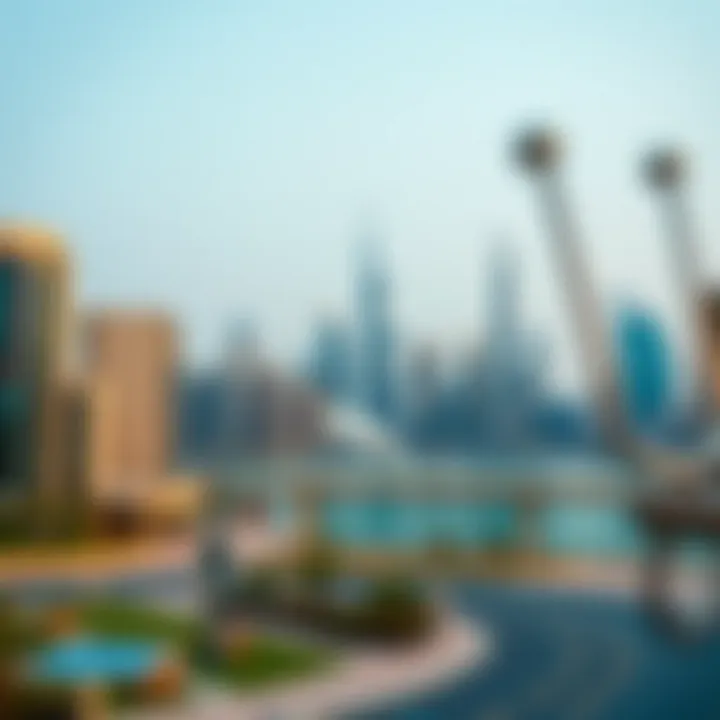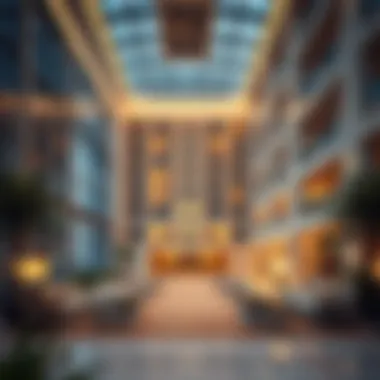Five Years of Living in the UAE: Insights and Tips


Intro
Living in the United Arab Emirates can be likened to stepping into a world where the modern meets the ancient, and cultures converge in a vibrant tapestry of life. Over the span of five years, one can experience the shifting sands of the real estate market, witness the dynamic cultural landscape, and adapt to a lifestyle that often exceeds expectations.
This article takes a closer look at what one can anticipate when making the UAE their home. From the latest trends in real estate to the enriching cultural experiences that shape daily life, the insights shared here aim to provide a thorough understanding for potential expatriates, investors, and individuals intrigued by this unique nation.
By diving into the nuances of the property sector and exploring the various lifestyle offerings, this piece serves to illuminate the potential challenges and rewards of residing in the UAE, particularly for those eyeing the bustling city of Dubai as their new home. Whether one is a first-time homebuyer or seasoned investor, understanding the local market will be invaluable.
Market Insights
Current Trends in Dubai Real Estate
The real estate landscape in Dubai has experienced significant fluctuations over the last few years. Post-pandemic, there is a noticeable increase in demand for residential properties, especially within certain communities. Places such as Dubai Marina and Downtown Dubai remain highly coveted, but emerging areas like Dubai South and Mohammed Bin Rashid City are also catching the eye of savvy investors. Properties here are not just buildings; they are positioned against a backdrop of new infrastructures, such as road expansions and transportation projects.
Investors looking into Dubai should keep an eye out for key trends:
- Increased Focus on Sustainability: More developers are prioritizing eco-friendly projects, which appeal to a growing demographic of environmentally conscious buyers.
- Short-term Rentals: With tourism booming, many opt for apartments that serve dual purposes—both home and a short-term rental investment.
- Smart Home Technologies: Many new properties come outfitted with smart home upgrades, representing how technology is woven into everyday living.
Investment Opportunities in Key Areas
Investors would do well to consider areas known for solid returns and steady growth. Properties in the following neighborhoods have been resilient despite market fluctuations:
- Dubai Hills Estate: Known for its affluent lifestyle and family-friendly amenities.
- Jumeirah Lake Towers (JLT): An area bustling with business and residential units, providing a versatile investment opportunity.
- Silicon Oasis: This area is an emerging tech hub with many opportunities for renting out to professionals in the tech field.
The ever-changing landscape of Dubai real estate presents both challenges and prospects, making it essential for would-be residents to conduct thorough research.
Lifestyle Features
Luxury Living and Amenities
Living in the UAE often means access to a level of luxury that can sometimes be overwhelming. From high-end shopping malls such as The Dubai Mall to myriad dining options that range from street food to gourmet cuisine, residents enjoy a blend of modern comforts. For those seeking relaxation, incredible resorts dot the shoreline, and five-star hotels offer spa treatments that are second to none.
Moreover, community features significantly influence lifestyle decisions. Gated communities often provide private pools, gyms, and even parks, fostering a sense of belonging among residents. The UAE is also known for its cosmopolitan environment, attracting individuals from various backgrounds of life—which in turn presents a melting pot of culinary and cultural experiences.
Cultural Attractions and Experiences
The UAE, and particularly Dubai, is rich in cultural experiences. There's never a dull moment, with events happening year-round—from traditional festivals celebrating Emirati heritage to modern concerts featuring world-renowned artists.
Visitors and residents alike can immerse themselves in experiences that range from visiting the historic Dubai Creek and Al Fahidi district to enjoying contemporary art shows in the Alserkal Avenue area. There’s something about seeing both the old souks and modern skyscrapers that adds depth to one's understanding of the UAE's vibrant identity.
Understanding the UAE Residential Landscape
The UAE residential landscape is a vibrant tapestry, woven with threads of tradition, innovation, and rapid change. Understanding this landscape is crucial for anyone contemplating life in the Emirates. It offers insights not just into the physical spaces where people reside but also into the cultural and economic factors that influence living conditions. By getting a grip on how the real estate market has evolved, individuals can avoid costly mistakes while navigating their choices in housing or investments.
Historical Context of UAE's Real Estate
Historically, the UAE has transformed dramatically from a collection of fishing villages into a hub of commerce and tourism. This transformation began in the mid-20th century with the discovery of oil, which catalyzed rapid urbanization. Cities like Dubai shifted from modest beginnings to glitzy metropolises marked by towering skyscrapers and sprawling residential complexes.
Real estate developments in the UAE often reflect greater social and economic shifts. For instance, the establishment of freehold property for foreigners in 2002 opened floodgates for foreign investment, diversifying the types of residential offerings available. These historical contexts paint a comprehensive picture of how the UAE’s residential scene is not static but highly adaptive to both global influences and local aspirations.
Current Market Trends in Dubai
The ongoing dynamism of Dubai’s real estate market is not just a product of historical trends but also of specific current realities that deserve closer inspection.
Property Value Fluctuations
Property value fluctuations in Dubai often draw attention from investors and homeowners alike. In recent years, the market has experienced both ups and downs in property prices. These fluctuations can stem from various influences including demand and supply dynamics, investment sentiment, and government policies.
For example, in 2020, the pandemic caused a brief dip in property prices; however, the market is rebounding due to increased demand from both local and international buyers. According to various real estate analysts, this resilience showcases Dubai’s potential, as many view it as a safe haven for investment. This aspect of property value fluctuations isn’t just beneficial—it’s critical for understanding long-term trends and positioning oneself effectively in the market.
"Dubai’s property market behaves like a seesaw; understanding its balance is vital for smart investment choices."
Impact of Global Events
Every so often, global events leave their mark on local markets, and Dubai’s case is no exception. Affected significantly by factors such as geopolitical issues, global economic crises, and even environmental challenges, there's a cascading influence on property prices and development timelines.
For instance, the COVID-19 pandemic disrupted many sectors, including real estate. Those who were considering buying or investing in property during this time faced uncertainty, leading to delays in decision-making. Conversely, some events can prompt a surge in interest, creating opportunities for developers and investors alike. Keeping an eye on these global trends is essential for anyone looking to navigate the complexities of Dubai’s property landscape effectively.
Sustainable Development Initiatives
In recent years, sustainability has taken center stage in the UAE’s residential landscape. The government is keen on promoting green initiatives, which include sustainable urban planning and eco-friendly construction practices. This push towards sustainable development not just ensures environmental preservation but also adds long-term value to properties.


The Dubai Sustainable City project, for example, has garnered much attention for its commitment to renewability and self-sufficiency, showcasing how modern residential areas can be integrated with sustainable practices. These initiatives present a unique opportunity for forward-thinking investors and residents looking to contribute to a greener future. Recognizing this aspect of the market allows for informed decisions about where to live or invest, keeping in mind both financial benefits and environmental responsibility.
Understanding these critical elements within the UAE residential landscape can provide a solid foundation for any prospective investor or expatriate. By grasping the historical context, current trends, and the shifts driven by global events and sustainability measures, it’s possible to navigate the complex tapestry of life in the Emirates.
Life Dynamics within the Emirates
The experience of living in the UAE, particularly over a span of five years, goes far beyond the glimmering skyline or luxurious lifestyle often associated with cities like Dubai. Life in this region is a tapestry woven with diverse cultures, fluctuating markets, and evolving social norms. Understanding the dynamics at play is crucial, whether you're aiming to make a long-term commitment to residency, seeking investment opportunities, or simply wanting to grasp what makes life truly tick in this vibrant country.
Cultural Integration in a Diverse Society
Intercultural Communication
Intercultural communication forms the bedrock of social cohesion within the UAE. This aspect emphasizes how individuals from various backgrounds exchange ideas, language, and traditions. Given that the UAE is home to a melting pot of nationalities, with expatriates constituting a significant chunk of the populace, successful interaction is key.
One key characteristic of intercultural communication in the UAE is its emphasis on respect and understanding. The rich mix of cultures results in not just increased tolerance, but also fosters rich discussions that allow for a deeper appreciation of differences.
A unique feature of this interaction is the use of multilingualism—often, you will find people deciphering their conversations in Arabic, English, and their native tongues. This adaptability is not just refreshing; it serves as a bridge that can ease tensions and bring people together. The advantages of this practice are manifold; it builds powerful networks and encourages mutual growth, but also has its challenges, like misinterpretations that can arise in conversations.
Social Norms and Etiquette
Social norms and etiquette are essential facets of life in the Emirates, steering everything from daily interactions to formal gatherings. This region has its traditional values maintained closely alongside a modern, international outlook. The basic characteristic of these norms is rooted in Islamic traditions, which influence perceptions of courtesy and respect.
Incorporating these values into daily life offers significant benefits. For instance, understanding the importance of dress codes and modes of greeting can set a positive tone for any interaction, fostering goodwill.
A standout feature of the UAE's social etiquette is the emphasis on hospitality—offering coffee and dates to visitors is far more than a nicety; it's a welcome gesture steeped in tradition. However, the flip side can sometimes lead to discomfort for those unfamiliar with the nuances, making awareness and willingness to learn vital.
Work-Life Balance in UAE
Corporate Culture
The corporate culture in the UAE is distinct and multifaceted, shaped heavily by both regional traditions and global influences. One significant aspect of this culture is the focus on performance-driven results, which can sometimes overshadow other considerations.
Employees often find that adaptability and resilience are highly valued traits. A notable feature of the corporate environment here is the blending of local customs with international business practices, providing an enriching yet challenging landscape.
Consequently, for expatriates or those considering moving, embracing this corporate culture can help bridge the initial gap, facilitating smoother transitions. Yet, the fast-paced nature also presents challenges, including increased pressure that can lead to burnout if not managed carefully.
Recreational Activities
When it comes to recreational activities, the UAE truly shines. From desert safaris to high-end shopping malls, there is something for everyone. The cultural significance of these activities contributes to a well-rounded lifestyle in the region, providing essential outlets for relaxation and socializing.
One defining trait is that many recreational options are designed to cater to diverse interests, making it a popular choice for families and singles alike. The unique feature here is the blend of traditional and modern leisure, such as enjoying a day at the beach while considering iconic landmarks as backdrops.
Participation in these activities brings about numerous advantages including opportunities for networking, community building, and stress relief. Nevertheless, the heat during the summer months can be a downer, leading many to seek indoor alternatives that might not possess the same allure.
"Understanding the dynamics of life in the UAE is not just essential for integration; it enhances the overall quality of life, making every moment spent more enriching."
Real Estate Investment Opportunities
Investing in real estate within the UAE offers a myriad of options that can significantly bolster one’s financial portfolio. The rapid growth of the property market here reflects broader global trends, while offering unique elements that appeal to both seasoned investors and newcomers alike. Real estate can serve as a lucrative avenue for income generation and asset appreciation in this dynamic region.
Types of Property Investments
Residential vs Commercial Properties
When diving into the realm of property investments, one must distinguish between residential and commercial properties. Residential properties, such as apartments and family villas, focus on providing housing solutions. They tend to be a popular choice due to the continuous demand from expatriates and locals alike. This demand offers stability, making residential investments a relatively safer bet, particularly during economic downturns.
On the flip side, commercial properties—which include office spaces, retail units, and warehouses—can yield higher rental returns as businesses invest in spaces that suit their operational needs. The key characteristic of commercial properties is that contracts often extend for longer durations compared to residential leases, providing a stable income stream. However, this market may be susceptible to economic shifts, making it essential for investors to keep an ear to the ground regarding market trends.
In deciding between the two, consideration of specific factors—such as location, intended investment horizon, and risk tolerance—becomes paramount. Residential properties often enjoy buoyancy as more people look to settle into communities, whereas commercial investments can offer greater returns at higher risk.
Off-Plan Developments
Off-plan developments present another interesting avenue for property investment. These are properties that are purchased before they are finished, giving buyers the perk of capitalizing on potential future appreciation. The key appeal here lies in the opportunity to acquire a unit at a lower price than a completed property, which can result in significant returns once the project is finished.
An important feature of off-plan purchasing involves flexibility during the payment phase, often with staggered payments scheduled throughout the construction period. This format allows investors to manage their cash flow more effectively. However, it’s essential to approach off-plan purchases with caution, as there are inherent risks, such as delays in construction or market downturns that could affect property values. Therefore, thorough research on the developer and project is essential.
Navigating Property Laws and Regulations
Understanding the legal landscape surrounding property investment is critical for any potential buyer, especially foreigners looking to participate in this market. The UAE has distinct laws that dictate how properties can be bought, sold, and owned, particularly regarding foreign investments.


Ownership Rights for Foreigners
Foreign investors enjoy considerable rights when it comes to owning properties in the UAE. A significant aspect is that foreigners can fully own properties in designated areas, often referred to as freehold areas, without the constraints typically found in other countries. This ownership can empower investors significantly, as it aligns with long-term residency prospects.
However, it’s crucial to acknowledge the regulations in place that require foreign ownership structures to comply with local laws regarding property management and leasing. Understanding these legal frameworks ensures that ownership rights are upheld, and can prevent any unwarranted surprises down the line.
Necessary Documentation
Addressing the necessary documentation for property transactions cannot be overstated. Ensuring you have all the requisite paperwork in order is the backbone of a smooth transaction. Generally, documentation includes proof of identity, financial statements, and title deeds among others.
Navigating this bureaucratic landscape can certainly raise eyebrows, but engaging a reputable real estate agent or legal expert can help mitigate the headache. Being meticulous about collecting and reviewing necessary documentation not only safeguards against legal entanglements but also streamlines any potential future transactions.
Investing in real estate in the UAE requires more than just capital; it requires a strategic understanding of the market dynamics and legal framework.
In summary, the UAE's real estate market holds compelling opportunities across both residential and commercial sectors, boosted by a unique legal framework conducive to foreign investors. Grasping these details is fundamental to making informed decisions for those considering capitalizing on this vibrant market.
Lifestyle Adjustments and Opportunities
In the journey of integrating into life in the UAE, lifestyle adjustments become pivotal. This section delves into the key aspects affecting expatriates and residents, shedding light on how various opportunities arise from these adjustments. Whether it's reevaluating personal finances, adapting to cultural norms, or seeking educational avenues for children, understanding these shifts can help ease transitions and enhance overall quality of life.
Cost of Living Comparisons
Accommodation Costs
When moving to the UAE, especially cities like Dubai and Abu Dhabi, accommodation costs are usually at the forefront of anyone's budgetary considerations. Rent can fluctuate significantly depending on the area. Popular districts like Downtown Dubai tend to attract higher prices due to their vibrancy and accessibility. Alternatively, areas like Jumeirah Village Circle offer more budget-friendly options without compromising on essential amenities. For instance, a one-bedroom apartment can range anywhere from AED 5,000 to AED 12,000 per month, depending heavily on location.
A unique feature of accommodation in the UAE is the concept of furnishing. Many apartments come fully or semi-furnished, which might seem steep at first but can be a cost-effective solution in the long run. This reduces the hassle of buying furniture that can often add layers to the moving in process. However, it's also vital to consider long-term commitments. Some expats find themselves occasionally unhappy with their choices, leading to frequent relocations, which is both inconvenient and may cause financial strain. Therefore, carefully weighing these factors is key.
Day-to-Day Expenses
Understanding day-to-day expenses can be as critical as grasping housing costs. Expenses such as groceries, sports, and personal care can rapidly accumulate. For example, dining at a mid-range restaurant may cost you around AED 100 per person, whereas cooking at home can significantly cut those costs.
One distinct aspect of daily expenses in the UAE is the presence of affordable options alongside upscale choices. While luxury malls boast high-end brands, local markets like the Spice Souk or Carrefour offer fresh produce at lower prices, appealing to budget-conscious individuals. There are pros and cons to consider. On one hand, the variety allows for a tailored living experience, and on the other, the high cost of imported goods can affect overall expenditure. Learning where to shop can yield great savings.
Educational Opportunities and Schools
International Schools
For expatriates with children, international schools are often the go-to option for providing quality education that aligns with varied international curriculums. Schools like the Dubai British School and the American School of Dubai are known for their solid academic reputation. These institutions, in addition to offering respected curricula, also promote cultural exposure, which is vital in the multicultural landscape of the UAE.
However, these choices come with a significant price tag, usually between AED 30,000 and AED 100,000 a year, depending on the level of education. While international schools provide numerous benefits, the high fees can weigh heavily on family budgets
Curricular Options
Curricular options in the UAE are vast, catering to various educational philosophies. The British curriculum remains popular, while the American and IB systems are also widely available. This diversity allows parents to make informed decisions based on their child’s learning style and future aspirations.
The unique feature here is the blending of local culture with international standards. Schools often include Arabic language classes and cultural activities to foster a well-rounded education. While this international approach can lead to high-quality outcomes, parents sometimes face challenges related to adapting to different educational systems, which require active engagement and regular monitoring. By scrutinizing these curricular options, families can choose what suits their needs and ultimately ensures their children excel.
In summary, living in the UAE involves a range of lifestyle adjustments that can significantly affect one's quality of life. Balancing accommodation costs with day-to-day expenses and securing the right educational opportunities offers residents the chance to fully enjoy what this vibrant region has to offer.
Legal Considerations for Long-term Residency
Understanding the legal landscape is crucial when considering a long-term stay in the UAE. Whether you’re an investor, a family relocating for work, or an expatriate seeking new opportunities, knowing the ins and outs of residency law can make a world of difference. The benefits of having clear legal status cannot be underestimated; it opens doors to numerous services, potential business opportunities, and, importantly, peace of mind.
Visa Requirements and Processes
Types of Residency Visas
In the UAE, there are various types of residency visas that cater to different individuals and their needs. The most common ones include employment visas, investor visas, and family-sponsored visas. Each comes with its own set of requirements and benefits.
For instance, employment visas are typically granted to foreign workers who sign a contract with a UAE employer. This means that not only are you gaining a position in one of the fastest-growing economies, but you're also securing the right to reside in the country. The investor visa, on its part, is geared towards those wishing to start or invest in a UAE business, offering a significant advantage for those looking to dive into the real estate market.
A notable characteristic is that the duration of these visas can often extend up to three years, which is a favorite among many. That said, it’s always advisable to keep abreast of the unique features, such as the possibility of getting a long-term visa under specific conditions—giving you enough breathing space to settle in.
Renewal Procedures
The renewal process of residency visas in the UAE is straightforward but requires timely action. Typically, you need to initiate the renewal at least 30 days before the visa expiration date. This foresight can save you from facing unnecessary fines or interruptions in your status. The key here is to have your documents in order—like health insurance and tenancy agreements—because the authorities need these details before approving your renewal.
It’s worth noting that the UAE has made it easier than ever for residents to navigate this process online. However, be aware that not addressing renewal promptly can lead to legal headaches. Therefore, understanding the nuances of the renewal procedures is essential for a seamless residency life.


Tax Implications for Residents
Income Tax Framework
Fortunately for residents, the UAE stands out as an attractive option due to its income tax framework. In essence, the tax laws are designed to favor both individuals and businesses, which is a major draw for many expats. Not bearing a personal income tax allows you to retain a higher portion of your earnings. This aspect significantly enhances the appeal of the UAE for potential residents and investors alike.
However, while the lack of income tax is often highlighted, being aware of other types of taxation—like the VAT at 5%—is crucial. These details can inform better financial planning and investment strategies. Additionally, keep in mind that being tax-efficient requires diligence and understanding of applicable local laws.
Real Estate Tax Considerations
When dealing with property investments in the UAE, being mindful of real estate tax considerations is indispensable. The property market is robust, but understanding associated costs like registration fees and the annual municipality tax is essential. Most expatriates are keen to know that while there is no capital gains tax, there might be fees tied to the buying and selling processes, which can affect overall profitability.
Also, some emirates have specific regulations that may impact your tax liabilities. Knowing these details helps you not just manage costs, but also make informed decisions about where to invest. For example, Dubai's long-term investment returns in real estate have made it a favored location, but it’s always wise to calculate all visible and hidden costs before diving in.
Understanding the legal aspects of residency can empower you to plan your life in the UAE more accurately, reducing risks associated with compliance issues and financial pitfalls.
Community Living and Social Connections
In the vibrant tapestry of the United Arab Emirates, particularly in cities like Dubai and Abu Dhabi, community living and social connections play a pivotal role in shaping the expatriate experience. Integrating into this multicultural landscape goes beyond simply settling in; it involves forging bonds, understanding diverse cultures, and participating actively in social frameworks. This dynamic not only enriches personal lives but also acts as a catalyst for professional networks, making it essential for anyone looking to thrive in the UAE.
Building a Social Network
Expat Communities
One key facet of social integration in the UAE is the presence of expat communities. These groups serve as the first port of call for newcomers, often providing a sense of familiarity in a foreign land. Individuals flock to these communities due to their crucial role in easing the transition process. They offer a variety of resources such as social events, support groups, and cultural exchanges, all aimed at fostering connection among individuals from similar backgrounds.
A notable aspect of expat communities is their unique cultural festivals and social gatherings, which often act as informal platforms for networking. This creates not just opportunities for recreation, but also for collaboration in professional spheres. While engaging with these communities might take time and effort, the connections developed can lead to friendships and potentially beneficial partnerships.
However, there can be disadvantages too. Some expats may find themselves gravitating solely towards their national communities, which might limit exposure to the broader cultural experiences that the UAE offers. Striking a balance between integrating into a native group and interacting with diverse cultures can lead to a more enriching experience.
Networking Platforms
Alongside physical communities, networking platforms have transformed the way people connect in the modern age. Websites like Meetup or even social media platforms such as Facebook host groups specifically for various interests, whether they be professional networking or more casual meetups. These platforms have become immensely popular because they provide a convenient way to connect with others who share common interests or professions.
The unique feature of these platforms is their ability to facilitate connections based on mutual interests, rather than just geographical proximity. This can lead to both personal and professional networking opportunities that might not arise in traditional social settings.
One downside, however, can be the superficial nature of some interactions. Online connections may sometimes lack the depth found in face-to-face meetings. Finding balance in how, when, and where to network - both online and offline - can make all the difference.
Participating in Local Events
Cultural Festivals
Participating in cultural festivals offers another enriching avenue for individuals to engage with the local community. These events showcase the UAE’s rich heritage and diverse traditions, providing opportunities to experience various artistic expressions and culinary delights. Highlighting the best of Emirati culture alongside the traditions of expats, these festivals enable newcomers to understand local customs while promoting appreciation and respect for diversity.
What makes these festivals particularly beneficial is their capacity for community bonding; they bring together people from all walks of life in a festival atmosphere that celebrates differences and similarities alike.
On the flip side, the sheer size of these events can sometimes be daunting for newcomers, possibly leading to an overwhelming experience. Participating actively may require stepping out of comfort zones, which can be challenging. However, successful interactions here can significantly uplift one's sense of belonging.
Volunteer Opportunities
Lastly, engaging in volunteer opportunities can serve as a rewarding way to connect with the community. Many expatriates find this route satisfying—not just for the altruistic aspects but also for the chance to meet like-minded individuals motivated by social change.
Such opportunities often portray a genuine aspect of local life, allowing expatriates to contribute positively while learning more about Emirati societal structures. Moreover, volunteering often helps individuals gain valuable insights into local customs and behaviors, adding layers of cultural understanding crucial for living in a foreign environment.
Yet, these roles may not always align with expectations of the level of involvement or impact, and candidates might need to be prepared for the realities that may not match their altruistic ideals. Nonetheless, the friendships and connections formed during such experiences can leave lasting impressions and results.
"Establishing genuine connections within a community shapes not only personal life but also professional trajectories, especially in a diverse place like the UAE."
Epilogue on Five Years in the UAE
After five years of immersing oneself in the life and culture of the United Arab Emirates, especially in a bustling city like Dubai, it becomes clear that this journey is far from just a change of address. The significance of understanding how to navigate this vibrant environment is crucial for not only personal happiness but also for success in various aspects including investments and social integrations. This conclusion reflects not merely on past experiences but more so on the paths carved out and the lessons learned during this transformative period.
Reflections on Personal Growth
Living in the UAE can feel like riding a roller coaster; it's thrilling, sometimes dizzying, and can even be a bit challenging at times. Over these years, many individuals often find themselves evolving in ways they never imagined.
- Cultural Adaptation: One of the fundamental aspects of growth during this period is learning to appreciate the rich tapestry of cultures that the UAE represents. The array of nationalities creates an environment where intercultural communication becomes essential. You figure out how to respect traditions while remaining true to your own values.
- Professional Development: Engaging in the local economy often leads to professional insights. Many have expanded their business acumen, learning new skills that are applicable both locally and globally. Networking plays a pivotal role here. Making connections at events or even casual gatherings often opens doors you didn’t know existed.
- Personal Resilience: The heat can be quite relentless. However, dealing with the challenges—be it the climate, navigating bureaucracy, or adapting to local customs—actually strengthens resolve and adaptability. As they say, what doesn’t break you makes you stronger. Each hurdle faced can teach valuable lessons that help in various areas of life.
Reflecting back, it’s easy to see how these years in the UAE became a catalyst for profound personal growth. It’s not just about living abroad; it’s about evolving and adapting in ways that prepare one for future challenges.
Looking Ahead: Future Prospects
As you stand at the threshold of another chapter after five years in the UAE, the future seems ripe with possibilities. Eventual choices for investors, expatriates, or locals tend to factor in more than just economic forecasts; rather, a holistic understanding of lifestyle and culture entwined with one’s professional goals becomes paramount.
- Continued Economic Development: The UAE, particularly Dubai, is renowned for its ambitious projects and sustainable initiatives. Future investments are likely to attract both local and international players due to government incentives aimed at developing new sectors like technology and renewable energy.
- Cultural Exchange: The trend of cultural festivals and community-oriented events is expected to grow. This hints at a future where cross-cultural exchanges become part of everyday life, and opportunities for personal and community growth rise accordingly.
- Expat Community Engagement: For newcomers and long-term residents, the expat community surges in vibrancy. It's likely that involvement in local events, whether through volunteering or cultural exchanges, offers a fulfilling means to embed oneself deeper into the local fabric. This integration will be crucial for anyone wishing to reside long term.
"Five years can unfold a wealth of opportunities, challenges, and friendships that redefine your outlook on life itself."















